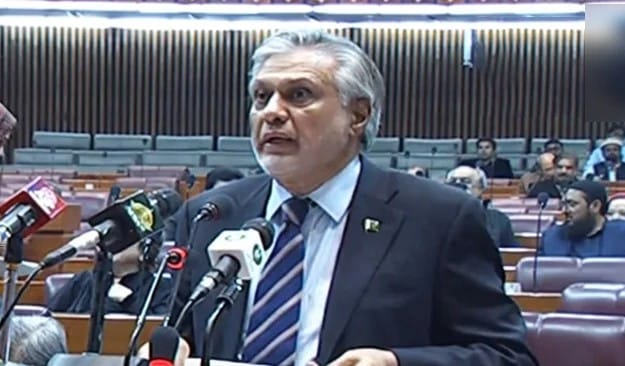Finance Minister Ishaq Dar presented the “mini-budget” in the National Assembly and Senate on Wednesday to comply with the International Monetary Fund’s (IMF) requirements for the revival of the failed $6.15 billion program.
Through the supplementary bill, the government has proposed increasing the goods and services tax from 17 percent to 18 percent to earn an additional 170 billion rupees ($639 million) in income for the current fiscal year, which ends in July.
In addition to boosting taxes on luxury products, first- and business-class travel, and cigarettes, the plan also called for increased taxes on several other items.
Speaking to the gathering, Dar observed that the current administration had only been in power for a short time when it faced the challenging challenge of managing the floods, which caused an estimated Rs8,000 billion in damage to the country.
He urged that the agreement between the PTI government and the IMF be read aloud in the chamber. In addition to the government, the state of Pakistan was also a signatory to the deal, but Imran Khan violated it, he continued.
Dar informed the National Assembly that the government had requested a 40 billion rupee (Pakistani rupee) increase in the Benazir Income Support Programme (BISP) budget to protect the most disadvantaged members of society from the impacts of growing inflation.
According to him, the government has proposed increasing the funding for the BISP from Rs360 billion to Rs400 billion and delivering an additional Rs40 billion to the program’s participants.
The finance minister’s announcement comes when Pakistan’s economic problems, such as a rising fiscal deficit, shrinking foreign exchange reserves, and high inflation, are escalating. In addition, the IMF terminated its $6.85 billion agreement with Pakistan in 2022 due to the government’s failure to accomplish crucial reform objectives.
Key Highlights
- Increase in GST on luxury items from 17% to 25%
- Increase in GST from standard 17% to 18%
- GST to not be imposed on wheat, rice, milk, pulses, vegetables, fruits, fish, eggs, meat
- FED on business and first-class air tickets be increased to Rs20,000 or 50% — whichever is higher
- 10% withholding adjustable advance income tax to be imposed on marriage halls
- Increase in FED on cigarettes, soft and sugary drinks
- FED on cement to be raised from Rs1.5 kg to Rs2 kg
- BISP stipend to be increased; govt to allocate Rs400 billion for program
Submitting the “mini-budget” is a crucial step in satisfying the IMF’s conditions for the program’s restart. However, whether the administration can implement the necessary economic reforms to enhance the nation’s economy and get IMF support remains uncertain.
Dar advised the population to adopt a “simple way of living” amid the session’s nearly one-hour-long wait. Even though the floods damaged standing crops, he claimed that the government paid Rs300 billion to help those impacted.
“A commission should be established to determine the root reason of the country’s economic failure,” he added, adding that the country’s circular debt has reached “destructive” proportions.
He slammed the previous administration, alleging that although the PTI government had a deal with the IMF in 2019, the PML-N government is now upholding it on behalf of Pakistan.
The state was given precedence over politics. Everyone can see the lost political capital.
According to Dar, following consultations with the IMF, the government has agreed to impose levies totaling 170 billion rupees. But, he continued, “We must impose more taxes because we were unable to reach our previous tax collecting objective.”
According to him, the circular debt reached 2,467 billion rupees during the PTI administration, but the current administration has been able to contain its rise to some degree.
The government aims to generate an additional 170 billion rupees ($639 million) in income during the current fiscal year, which ends in July, by proposing to increase the General Sales Tax on the import of luxury products from 17 percent to 25 percent. Additionally, the present GST rate of 17 percent has been increased to 18 percent.
According to the minister, the government and IMF recently conducted conversations to revive the program. It was decided that the government would make painful decisions to stabilize the nation’s faltering economy.
He asserted that the new revenue measures would not affect the poor because the majority of the additional taxes were placed on items they did not use.
In addition to the plan to tax hotels and wedding halls, the measure included a provision to collect a tax in advance from commercial lawns, marquees, and clubs. In addition, a tax hike on mobile phones was proposed.
In addition, there is a plan to impose a 10% tax on beverages sold at retail and a tax on airline tickets purchased in advance.
The law proposed increasing the federal excise duty (FED) on cement from Rs 1.5 to Rs 2 per kilogram and the cement tax by Rs 0.50 per kilogram.
On wedding ceremonies, a 10% advance tax is imposed.
The financial measure includes a proposal to increase the value-added tax from 17 to 25 percent on cell phones costing more than $500. The collection of a 10% tax in advance was also proposed for weddings, seminars, workshops, exhibits, musical performances, and other events.
The proposed legislation stipulated that fruit juices and other beverages be subject to a 10% FED. In addition, it was suggested that first- and business-class flights would incur a FED of 20% or Rs. 50,000. (whichever is higher). In addition, a 10% tax on purchased or held shares was proposed.
Dar added that the government had earmarked Rs30 billion for youth loans and that farmers have received Rs1,000 out of the Rs2,000 indicated in the Kissan Package.
Cabinet members will offer a proposal to reduce government expenditures.
According to the finance minister, Prime Minister Shehbaz Sharif will soon reassure the nation about the Finance Supplemental Bill. In addition, the cabinet will shortly submit a plan to reduce government spending.
He claimed that notice of the issuance of Letters of Credit (LCs) for the opening had been sent to the pharmaceutical, petroleum, and sporting goods businesses. According to him, the previous and current tax collection goals of Rs170 billion will be fulfilled.
We urgently require the development of a road map because we must embrace a unified perspective on the economy. Our group must sit in a circle. We hope that the institutions will also provide full assistance,” he concluded.
Dar stated that despite the nation’s current hardships, growth is only achievable if we all work together.
The bill was then introduced to the Senate. However, the PTI organized a demonstration and encircled the platform of Senate Chairman Sadiq Sanjrani. In addition, they chanted anti-government slogans.
The proposals for the measure should be delivered to the house by February 23, according to the Senate leadership. The meeting was then postponed until Friday at 10:30 a.m.






